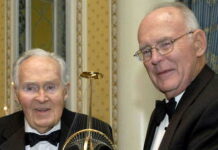On April 3, 1973, the first mobile call in history was made by its inventor, Martin Cooper. Fifty years later, the American engineer looks back at his creature with concern. The 94-year-old “Father of Mobile” remains convinced that our mobile phones have near-infinite potential. On the other hand, he admits to being “devastated to see people crossing the street looking at their cell phones. They’ve lost their minds.” “But when a few people have been run over by cars, they’ll understand,” he joked to AFP.
Apple smartwatch on his wrist, state-of-the-art iPhone in hand, Martin Cooper moves intuitively from email to photos and from YouTube to the app for adjusting his hearing aid. He sources each new model and thoroughly tests their capabilities. But, he confesses, the millions of applications available make you dizzy.
“I will never, ever be able to figure out how to use a cell phone the way my grandchildren and great-grandchildren do,” he says.
Martin Cooper’s cell phone, which he uses primarily for making calls, bears little resemblance to the heavy block of wires and electronic circuits he used to make the first mobile call in history, the 3 April 1973. He was then at the head of a team of designers and engineers from Motorola, which had invested millions of dollars in an attempt to beat Bell System, an American telecom giant, in the design of the first mobile telephone system.
Bell System had evoked this idea at the end of the Second World War, but had only managed to install, from the end of the 1960s, telephones in cars, in particular because of their enormous battery. For Martin Cooper, this did not allow real mobility. So, after three months of non-stop work, his team finally managed to develop the DynaTAC rover.
“That phone weighed over a kilo […] and its battery was enough to hold a conversation for about 25 minutes,” he recalls. But “that wasn’t a problem” because the device “was so heavy you couldn’t lift it for 25 minutes,” he said.
For his first call, Martin Cooper had the genius idea of calling his rival at Bell System, Dr. Joel Engel. “I said to him, ‘Joel, this is Martin Cooper […] I’m talking to you on a cell phone. But a real mobile, personal, portable, hand-held.” There was silence on the other end of the line. I think he was gritting his teeth. »
Those early cell phones weren’t cheap: around $5,000 apiece. The first to adopt them, according to the inventor, were real estate agents. Thanks to the mobile, they could both show houses and respond to new customers. “It doubled their productivity,” he says.
“Today mobile has become an extension of the person, it can do so much more,” says Martin Cooper. “And that’s just the beginning, we’re only beginning to understand what he’s capable of. »
“In the future, we can expect mobile to revolutionize education, health,” he said. “I know I sound like I’m exaggerating, but know that in a generation or two we’ll beat the disease. In the same way that his watch monitors his pulse when he swims, according to him, phones will one day be connected to body sensors that will detect illnesses before they occur.
The former engineer knew mobiles would eventually change the world, though he hadn’t imagined everything they would be capable of. “We knew that one day everyone would have a phone. We are almost there. »
As for people hypnotized by their phones, he thinks that will change. “Each generation will be smarter. They will learn to use smartphones more efficiently,” he predicts. “Sooner or later, humans always move on. »


















